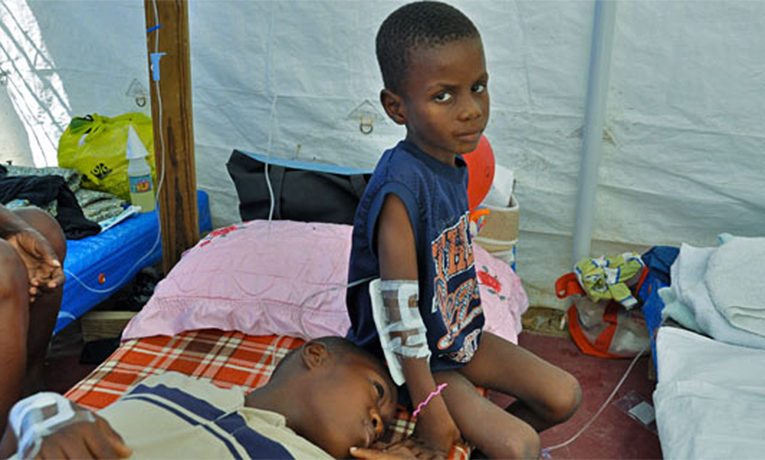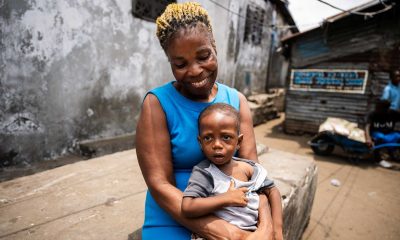April Perry, an Advanced Practice Nurse at Duke University Medical Center, just finished a one-week stint working at a Samaritan’s Purse cholera treatment center in Haiti. April has worked in Haiti for over 10 years, promoting public health initiatives in urban slums and rural villages with Luke’s Mission. April also has traveled to Uganda and Kosovo with Samaritan’s Purse as a volunteer nurse with the Children’s Heart Project. She blogged about her experiences in Haiti.
The Beginning
My first day and I survived and so did all of my patients. I worked with a great nurse, Carrie, who with me had half the pediatrics unit. In some ways I feel like this is a lot like Calvary—a place of great sorrow but one where great redemption also happens.
This is no longer “the cholera epidemic in Haiti.” It is Beris, who came in flaccid and with no pulse, his 5-year-old body limp and lifeless, but after 20 minutes of fluids he woke up and over the day was near recovery. It is the Mom and her 10-month-old twins who are here, all with diarrhea and vomiting, needing IVs and meds. Mom is really weak but we need her to breast feed the kids so we take them over periodically for that. It is the Dad going between his sick wife and his 11-month-old in the two wards, helping out with both.
But today was a good day. We only admitted one new child and several are slated for discharge tomorrow. A good starting day for me. Long day, short night to come. Thanks for your prayers for me and the people of Haiti.
The Reality
As you probably know, cholera leads to massive fluid loss through diarrhea and vomiting. This is managed on an individual basis by cutting holes in the cots and placing buckets under this hole. This is how people use the bathroom. The one-gallon bucket often is filled one-fourth to one-third full from one diarrhea stool. So disposal of waste is a significant thing that must be dealt with.
I am impressed with the setup here. Samaritan’s Purse has employed 180 Haitian staff doing so many roles. A woman comes through our ward four times a day washing the tarp floors with bleach solution. Another one uses a small chemical-type sprayer and sprays the poop buckets and the buckets for vomiting. Others sit at the door and monitor that everyone washes their hands as they should.
We had one child who came in so weakened from the fluid loss from diarrhea and vomiting. The nurses tried multiple times to get an IV in but couldn’t. As we watched it seemed like the child was going to stop breathing before we could get a line into the bone of the shin—a last resort for IV access. The nurse told me later that she was trying to decide what to do when he stopped breathing. She could do mouth-to-mouth but until fluids got in nothing else would be effective. Fortunately the intraosseous line got in and the fluids got in. Within several hours the child was much better. From near death to life in a matter of hours.
Mom and twins all went home today. That was great.
The Contrasts of Cholera
It’s so hard to know what experiences to share that will help you understand better what this horrible crisis is like. I can think of nothing to compare it to in our culture. Maybe some post-nuclear war movie might be the best thing.
As with anything in Haiti the contrasts are stark. A person weakened to the point of near coma when we leave at night is up walking around the next morning after receiving life-giving IV fluid. A really funny sight is seeing them carry their partially empty IV bags on their heads.
Another contrast is the amount that any given physical body can take. A 10-pound body ravaged with cholera, likely malaria, pneumonia, HIV, or something else we can’t figure out, still wants to use that bit of energy to want to play with balloons or bubbles.
Or the most peaceful looking baby sleeping on their cot literally covered in dozens of disease breeding flies. (The flies were especially bad yesterday—there must have been a hatching or something).
Some personal things:
Statement of fact, not a complaint—the hours are brutal. Leave at 5:30 a.m., back to base camp at 7:30 p.m. By the time you decontaminate, shower and change clothes, eat, lay everything out for the next day, it is time for bed. There is no social chit-chat or time to even get to know many people except those you work with.
Next, I couldn’t do this more than a week so I am grateful I didn’t sign up for any longer.
Today I was the only provider for the peds ward with 27 kids. The two nurses who worked with me were great and I would have been sunk without them.
Finally we have a little going away parade when the kids get discharged. We clap, give high-fives and send then on their way—the redemption I was talking about earlier.
The Final Chapter
Today was my last day here. We had a moderately full ward and lots of help.
As I reflect over this experience the overriding emotion is one of gratitude. So much redemption of life has occurred here this week. The intensity was tolerable with your prayers, and the Lord granted me the stamina I prayed for.
I feel gratitude on many levels: That I have skills, experiences, and talents the Lord can use in crisis situations like this to heal the sick in His name; that I have the time to give while still maintaining my other responsibilities; that I live in a developed country where a cholera epidemic is unlikely to ever occur and if it does my place of care will not be a cot with a hole cut in it for a toilet.
I am grateful for clean water, safe food, knowledge of sanitation practices and the ability to carry them out; that the Haitian people can benefit from the medical care we have and it can be used to support their medical care system which is so desperately lacking; for the thousands of volunteer hours that have been given by my fellow medical professionals for the sole reason of being the hands and feet of Jesus—not because they get paid, or for recognition, but just to be reflectors of Christ to those in need.
Finally I am so grateful to Samaritan’s Purse for their vision and resources. It is hard to impress me with Haiti work, but I am impressed. Logistics are great, security needs are addressed, and most importantly the patients are well cared for. Protocols are sound and supplies are available.
We have had chaplains available supporting us in prayer, getting up to give us devotions at 5 a.m., and doing servant things for us so we can be servants to our patients.
I am proud to have been associated with this work in the cholera epidemic with SP.
I am anxious to come home, but this has been one of the most rewarding things I have ever done. I am so grateful for all of you, your love, prayers, notes of encouragement.
I hope that you will ask God what part you can or continue to do to serve the poor, sick, needy, hungry, hurting, where He calls you. It is a mandate for the Christian—it isn’t optional.






